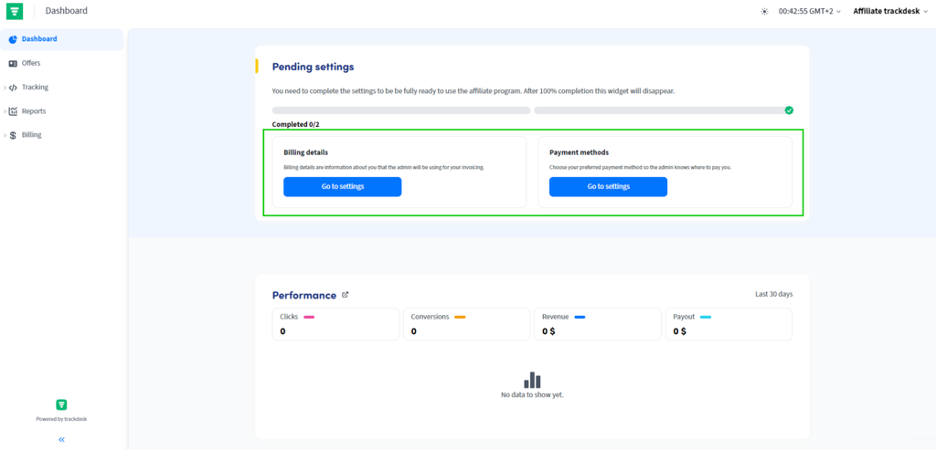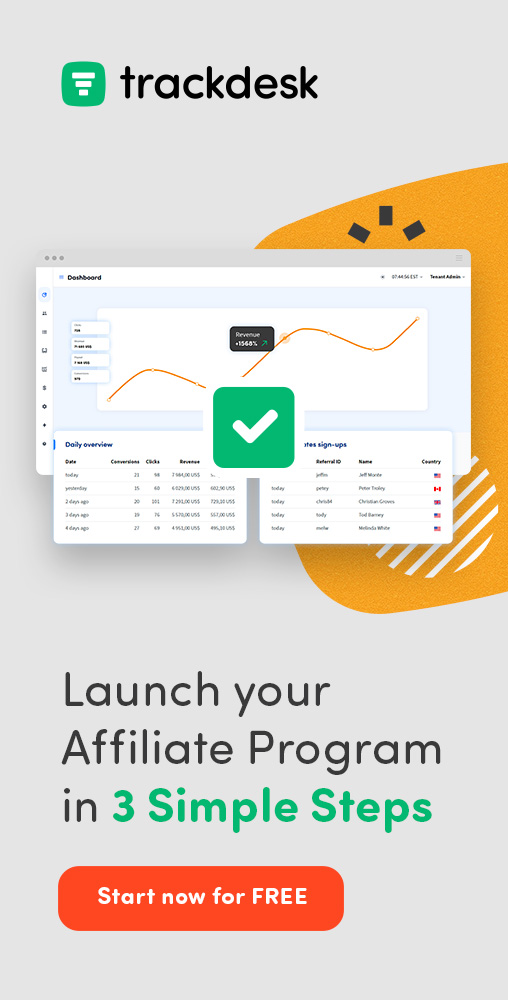
Affiliate Marketing for Small Business: An 8-Step Growth Path
Here's how to increase your small business sales through affiliate marketing with our simple 8-step strategy.
Affiliate marketing is a great growth channel for small businesses that often have budget constraints. It’s a performance-oriented marketing strategy that has a relatively lower risk and low barrier to entry compared to other marketing channels. It also gives them the opportunity to earn potentially higher ROI.
Learn more about how you can get started with affiliate marketing for small businesses. We’re sharing an easy-to-follow guide on how to grow your affiliate program for your small business.
Is Affiliate Marketing Right for You?
Marketing their products or services can be a significant challenge for small businesses with limited resources. This means that you only pay affiliates when they make a successful sale. Otherwise, you won’t need to pay commissions.
However, while affiliate marketing for small businesses seems like a promising solution that equips your business for growth, it might not always be the best tactic for you. To determine whether or not affiliate marketing is right for your small business, ask yourself the following questions first:
- “Can I afford it?” – While it’s considered a cost-effective means to market your business, affiliate programs for small businesses still have some costs involved, like commissions or freebies given to affiliate partners. Will you be able to cover such costs alongside other operating expenses?
- “Will I be able to manage my affiliate program effectively?” – Having an affiliate program that runs like a well-oiled machine takes considerable effort. You need to find, onboard, and manage affiliates, build relationships with them, track their performance, address concerns, and more. Check if you have the capabilities or resources needed to manage your affiliate program effectively. Alternatively, you could look into working with skilled partnership managers who can help you build and manage your own proprietary affiliate partners pool. Trackdesk has a Partnership Managers Marketplace that connects you with world-class and experienced partnership managers.
- “What are my competitors doing?” – One way to see if affiliate programs for small businesses could potentially work for you is to see what the competition is doing. If you find that they’re running successful affiliate marketing, then you might want to try exploring it for your own business.
If affiliate marketing looks like a promising growth channel to you too, then you will still need to consider the following key components:
- Having a marketable product: You need to have a product that you believe in, one that you’re confident enough to offer to the public. Keep in mind that not every product will lend itself well to affiliate marketing. So, before you choose a product to promote, make sure that, aside from being a high-quality product, it’s appealing, useful, or relevant to your target audience.
- Your affiliate marketing budget: A good affiliate program offers competitive commissions. Check to see if you can afford this with your budget, on top of other business-related expenses. Make sure that your affiliate marketing campaigns won’t eat into your profit margins too much.
- Finding the right affiliate niche: Affiliate marketing works for businesses of different sizes and business goals. However, your niche can influence whether or not affiliate marketing would be an effective tactic for your small business. Determine if you need to drive demand for your product in your niche and if there are potential affiliate partners within the same niche who could help promote your brand. Otherwise, your affiliate marketing campaigns may not be as effective, and you end up losing money instead.
One other significant consideration that’s worth looking into is whether affiliate marketing is capable of driving conversions and increasing sales. While this tactic can help you scale your business, small business owners will still need to lay the groundwork for a successful program. This means finding and building healthy relationships with high-quality affiliates, as well as guiding them properly so that they:
- Know your product well and promote it more effectively
- Know how to use your marketing creatives like banners in their promotions
- Are capable of converting traffic into sales through effective use of CTAs, engaging content, or compelling copy
How Affiliate Marketing Programs Can Help Small Businesses
While affiliate programs can vary depending on your industry or niche, they typically follow a performance-oriented model. If you’re planning to dive into affiliate marketing, below are five of the biggest reasons why you should consider using affiliate programs for small businesses to grow your brand.
1. A Cost-Effective Marketing Tactic
Earlier, we mentioned that affiliate marketing for small businesses follows a performance-based model, where brands only pay for each successful sale generated by their affiliate partners. You only pay for actual results, which can be in the form of sales or leads. You’re less likely to waste your budget, given that your expenses are linked directly to your revenue generation efforts. Affiliate marketing has positive effects on your top-of-funnel (ToFu) too. That’s because affiliate marketing utilises marketing tactics like blog posts, social media posts, and videos to generate brand awareness, effectively introducing audiences to your brand and allowing them to learn more about what you have to offer.
One good example of a small business owner leveraging affiliate marketing is Jordan Makelle, who runs Writing Revolt. The blog features posts that contain affiliate links. According to Makelle, one blog post on her website generates a significant amount of income monthly, which helps her small business. That particular post promotes Bluehost, a service that Makelle personally uses, and contains an affiliate link to the said service.

2. Helps Expand Your Reach
There may be cases where, even if you’ve tried different types of advertising, it’s still difficult for you to break into new markets or reach new audiences. Running an affiliate program can boost your brand’s visibility and reach as affiliate partners promote your products to their respective audiences. It’s also worth noting that 81% of consumers are more likely to research or purchase a product that’s been posted about by friends, family, or influencers. The referenced study also shows that 69% of consumers are more likely to trust recommendations coming from loved ones and influencers over information from brands.
3. Growing Brand Awareness
Affiliate marketing is also great for building brand awareness in a way that won’t burn through your marketing budget like TV ads would.
Each affiliate you work with already has an established following, and being promoted by these partners puts your brand out there in front of as many audiences as possible. As affiliate partners continue to promote your brand, your reach expands, along with the awareness of your brand.
4. Opportunity to Create New Partnerships
Given that small businesses tend to operate with limited resources, hiring an in-house marketing team isn’t always a solution, given constrained resources. Through affiliate marketing, you can create new partnerships with experts who leverage their knowledge and experience to promote your products to their audiences in a more compelling and effective manner.
5. Access to Measurable Results
Affiliate marketing provides you with a wealth of data you can use to gain insights on how you can optimise your affiliate program. Using a reliable affiliate tracking tool, you get access to data, such as metrics on clicks and sales, average order value (AOV), cost per acquisition (CPA), customer demographics, and consumer behaviour. If you’re using Google Analytics, you can also track the following:
- Traffic source and medium
- Channels
- Conversion rate
- Sessions
- Revenue
All of these can help you determine if your campaigns and affiliates are effective, further allowing you to make data-driven decisions that align with your marketing goals.
8 Steps to Start and Grow Your Affiliate Program
Ready to get started with affiliate marketing? Let’s dive into our proven 8-step guide that any small business can follow.
1. Determine the Best Time to Start with Affiliate Marketing
Before starting your own affiliate programs, it’s best to analyse relevant data first. This gives you a better understanding of how you should approach your affiliate marketing strategy. For example, start by looking at your finances and what the current affiliate landscape looks like. This will allow you to determine how much you can afford to offer as commission rates the level of competition within your niche or industry and get a clearer picture of metrics or KPIs you need to track. Your strategy should detail how much your commissions are, how often affiliates are paid, what marketing or promotion strategies your affiliates can use, and what incentives you’ll be issuing for high-performing affiliates.
2. Create a Powerful Brand
Your affiliate marketing success is largely dependent on your overall brand strategy and management. The stronger your brand is, the better your affiliate campaigns will perform. A powerful brand also helps establish consistency across your other marketing efforts. Some of the things you can do to bolster your brand include:
- Working with affiliates that align with your values
- Having an effective logo and using fonts and colours that align with your brand identity
3. Define Your Program Goals and Objectives
Establish realistic and measurable goals and objectives. Start small, such as reaching X amount of traffic coming from affiliate links or X amount of direct or branded searches for a certain amount of time. Other goals and objectives that can help you get started include the revenue you want affiliates to generate for a certain time period, as well as the conversion rate of affiliate links (from clicks to sales). Knowing your goals and objectives will allow you to assess the strengths and weaknesses of your programs later on, thus allowing you to make the appropriate changes to them as needed.
4. Build Key Partnerships and Choose Products with High Demand and High Conversion Rate to Promote
Finding the right affiliates and building key partnerships takes a considerable amount of effort. That’s because most affiliates will only promote the brands that they trust, as they’ll be laying their reputation and audience trust on the line. When finding prospects, consider the following:
- Their platform and the quality of content they publish
- Their authenticity and how they communicate with their audience
- The traffic their online channels generate
- If their image and values align with your brand
- How engaged their audiences are
Aside from finding the right affiliates, you also need to find the right products to promote. A good place to get started is by choosing products that have high demand and high conversion rates, as these have the potential to generate higher revenue for your business. And, if you have more revenue, you’ll be able to offer much more enticing commissions to your affiliates. From the perspective of affiliates, if they can get higher total commissions from a larger quantity of products rather than high-ticket items, it’s still a win-win situation.
5. Find the Best Affiliate Tracking Software for Your Needs
Having the right affiliate tracking software for your business is a must because it aids in monitoring affiliates and their performance, generates custom tracking codes, prevents affiliate fraud, and more. Depending on the tracking software you choose, some may even have additional helpful features that allow you to manage your affiliates more effectively. When choosing an affiliate tracking software, consider the following:
- Its features – Make sure that it has all the features you need or deem to be must-haves, like real-time reporting capabilities and scalability. Check our comprehensive overview of the best affiliate tracking software to learn more about your top picks and their essential features. [add link to the best affiliate tracking software page]
- Ease of use – A good tracking software should have a user-friendly interface, and it shouldn’t come with a steep learning curve.
- Integration and customisation – Check to see if an affiliate tracking software is capable of integrating seamlessly with your current tech stack. Also, assess its customisation capabilities, such as allowing you to create custom commission structures or payment terms.
- Customer support – A good affiliate tracking software must offer robust customer support. They should offer accessible multi-channel support options so you can easily reach out to a representative in case you run into any problems with the software.
6. Craft a Competitive Commission Structure
You should structure your commission rates in such a way that potential affiliates will find it attractive and worthwhile. Start by checking out the commission rates offered by your competitors so you’ll have an idea of what the average commission rates are like in your niche or industry. How will you offer better rates? How much can you afford to shell out for commissions within the context of your profit margins?
7. Identify the KPIs You Need to Measure

Having measurable objectives lets you determine whether or not your affiliate program is a success. Some of the commonly used metrics include:
- Clicks (the number of clicks an affiliate link receives)
- Conversion rate (the number of clicks that convert into actual sales)
- Cost of sale (how much each sale costs you).
Other KPIs you need to track include return on investment (ROI), customer lifetime value (CLV), and affiliate performance.
Monitoring affiliate activity and performance allows you to see which affiliates are performing well so you can focus on strengthening your partnership with them. If you find low-performing or dormant affiliates, based on metrics like their conversion and click-through rates, you may want to take measures to re-engage them. For example, you can reach out to them via personalised emails, give incentives like giveaways or coupons, organise contests, or give a limited-time commission boost to keep them interested and motivated.
Alternatively, if these dormant affiliates struggle with making a sale, you can ask them for feedback and ways on how you could provide support. It’s worth noting that testing your campaigns and offers also helps a lot. This allows you to see which elements are more effective and which ones need to be improved. Don’t forget to share your results with your affiliates.
8. Develop Clear Terms and Conditions
A contract that clearly outlines your terms, conditions, and expectations serves as a guideline for affiliates. It should detail how they can use your creative assets, as well as explain your commission structure and payout schedule to prevent miscommunication. Having a contract also ensures that you and your affiliates are protected in case any issues arise. While you can use templates to get started, you may find that you want to customise your contract to better suit your unique requirements. If possible, work with a lawyer who can draft a custom contract for you.
Final Thoughts
Aside from the abovementioned steps, here are some helpful affiliate marketing best practices for small businesses to keep in mind:
- Optimise your website. When a customer clicks on an affiliate link, they’ll be taken to your website. Make sure that they have the best experience possible by making your website easy to navigate and providing relevant or value-added content. Your website should be mobile-friendly, have fast page load speeds, contain catchy headlines and compelling CTAs, and have engaging copy that’s designed to convert.
- Create relevant offers. Your offers should be tailored to align with your target audience’s needs and pain points. Offer relevant promotions or incentives that encourage audiences to convert into paying customers.
- Protect your program from affiliate fraud. Fraudulent affiliate activity, such as click fraud and bot traffic, is a significant hurdle for many small businesses. To protect your brand, affiliates, and consumers from bad actors, set up fraud protection measures early on. You can use affiliate tracking software that’s equipped with such features. Trackdesk, for example, comes with a fraud protection feature for Starter, Business, and Enterprise plans.
- Don’t get too complacent. Once you launch your affiliate program, it might be tempting to just leave it be and focus on other aspects of your business. While it may seem like more work, it’s always best to be proactive, meaning you should continue to monitor your performance, optimise your website or landing pages to ensure that your content remains evergreen or relevant, and regularly ask your affiliates for feedback so you know how you can improve your affiliate program.
Affiliate marketing for small businesses is a cost-effective channel for growth. Discover trackdesk’s powerful features for affiliate marketing today. It’s free for up to $5,000 in monthly affiliate sales. Talk to our experts and jumpstart your journey to growth.
Dominik: add link to the best affiliate tracking software page
Tagging @dominik.sova@trackdesk.com here

I have a passion for storytelling. I believe that a good story delivers value while capturing, influencing, and sustaining its intended audience. This has always been, and always will be, my primary aim as a writer.


